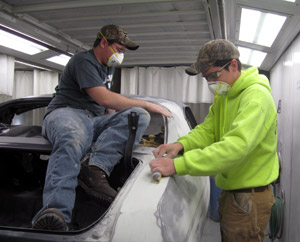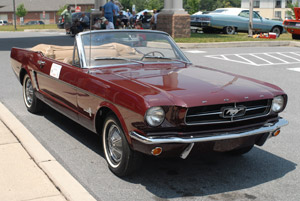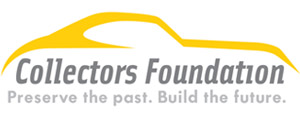Collectors Foundation Grants Startup Funds to Restoration Major
Thursday, April 5, 2012
 Born in the high-profile restoration of an automotive legend and abuzz ever since with student excitement at working on other vintage vehicles, Pennsylvania College of Technology's newest two-year major recently attracted a considerable boost.
Born in the high-profile restoration of an automotive legend and abuzz ever since with student excitement at working on other vintage vehicles, Pennsylvania College of Technology's newest two-year major recently attracted a considerable boost.The Collectors Foundation has awarded a $58,840 grant, payable over three years, toward the purchase of priority startup equipment and faculty development for the automotive restoration technology major that begins this fall.
"In these times of tight budgets, new majors such as automotive restoration would not be possible in this short period of time without the generous assistance from the Collectors Foundation," said Colin W. Williamson, dean of transportation technology. "The equipment we will obtain and the skills the faculty will acquire are the foundation of this program."
The Collectors Foundation is an educational grant-making organization founded by Hagerty Insurance and funded by collector vehicle and classic boat enthusiasts to serve youth development and the long-term interests of the collector vehicle and classic boat communities.
"Collectors are relieved that we're starting this major," said Williamson, who noted that the generous grant support reflects the industry's embrace of younger technicians whose passion can be molded by an academic attention to craft.
"There are only a handful of other public institutions in the country that offer a degree like this," the dean said, "and none of them is in the Northeast."
The major is typical of Penn College's ability to respond to job-market niches, but the speed with which it was approved is anything but. While some additions to the curricular catalog can take two years or more, the automotive restoration technology associate-degree major took six months from initial discussion to college President Davie Jane Gilmour's signature.
"This is not just a variant of our collision repair curriculum, however," Williamson explained, but a separate set of marketable skills structural, electrical and mechanical familiarity; interior/exterior know-how; sheet-metal forming; and archival research, among them unique to working on classic vehicles.
 And although the major began with students' eye-catching restoration of a 1965 Ford Mustang convertible for the Antique Automobile Club of America Museum in Hershey, Williamson said the "depth and breadth" of vehicles goes beyond "muscle cars," covering periods that range from pre-World War I vintage to the 1970s.
And although the major began with students' eye-catching restoration of a 1965 Ford Mustang convertible for the Antique Automobile Club of America Museum in Hershey, Williamson said the "depth and breadth" of vehicles goes beyond "muscle cars," covering periods that range from pre-World War I vintage to the 1970s.The dean expects initial enrollment to be about 20; only those who earn a "B" average or higher in selected major classes their first semester will be eligible to continue in the major.
"The employment potential for this is very, very good. It's a quiet industry, a word-of-mouth industry, but there's employability from day one," Williamson said. "It requires just the right kind of student, though. We're talking high-end vehicles here cars worth hundreds of thousands of dollars that can take years to restore. Anything less than the most serious students just won't do."
The involvement of the Collectors Foundation is seen as further credibility for a program that already earned respect with students' praiseworthy work on the Mustang. The car won a first-place junior award at the AACA's Eastern Regional meet, and the college plans to enter its follow-up project a 1978 Pontiac Firebird Esprit into competition, as well.
Students are now involved in the restoration of a 1970 Chevelle Super Sport, a project that is expected to take at least two years to complete.
The AACA museum, which owns all three of the cars on which Penn College students have worked so far, will be the school's primary source of vehicle work and its closest partner now that the two-year major has grown so explosively from a single elective class.
The association's Susquehannock Region chapter, another early champion of students working in automobile restoration, will continue to be a source of technical expertise, parts and encouragement for projects.
The college is also working with other regional museums in establishing partnerships to preserve and restore select vehicles to the mutual benefit of students' learning and the museums' collections, Williamson said.
In addition to providing future laboratory projects, industry respect will allow for an advisory committee of true national experts, the dean said, a prospect made easier by Penn College's location.
"Some of the best technicians live in the Northeast, and some major collectors are within 75 miles of Williamsport," he said, accessibility that opens the door to scholarship and internship opportunities.
More information about the Collectors Foundation can be found online .
For more about automotive restoration technology and other "degrees that work" in Penn College's School of Transportation Technology, visit on the Web or call 570-327-4516.
For more about Penn College, visit online , email or call toll-free 800-367-9222.
For more information about grant-funding opportunities, faculty and staff may contact the Grants and Contracts Office at ext. 7562 or through its Web portal.

